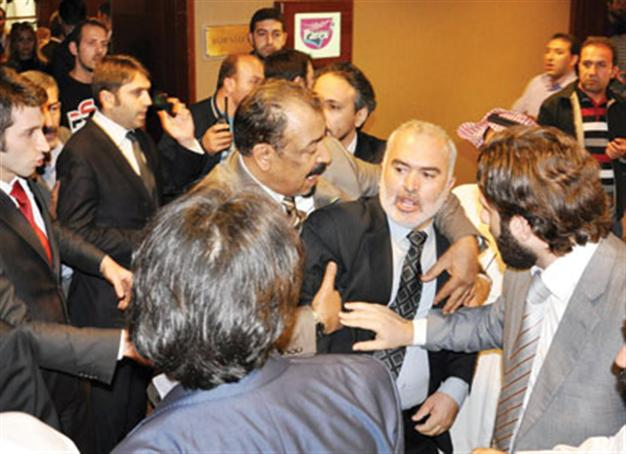Wanted: The real face of Syria’s opposition
İPEK YEZDANİ ISTANBUL- Hürriyet Daily News

Members of the Syrian opposition fronts argue among themselves during a meeting in Istanbul October 2, 2011. REUTERS Photo.
As the European Union applauds the formation of an opposition Syrian National Council, different opposition groups supportive of other political strategies make the Syrian opposition look dividedThe European Union hailed and welcomed the creation of the Syrian National Council (SNC) as a positive step forward yesterday, but it is still not clear who the real representatives of the Syrian opposition are due to divisions between different groups.
“In the last seven months, different groups or committees have been created by different opposition groups both inside and outside Syria. These groups have different strategic views. In fact, anybody who gathered five people together abroad started to say he created a high committee,” according to Halit Hoca, one of the founders of the SNC.
The Turkey-based SNC that announced its formation 10 days ago in Istanbul aims to topple Syrian President Bashar al-Assad’s regime. Others support the views of Russia, which has called on al-Assad to make reforms, while still others support the line of the Arab League Initiative, which proposes an earlier set of presidential elections to bring an end earlier to al-Assad’s current term that expires in 2014.
The recently-formed SNC includes representatives of the Muslim Brotherhood, the Damascus Declaration, Kurds, Islamists, Syriacs, grassroots activists, some leftists and Arab tribes.
Opposition groups that support the line of Arab League Initiative support the idea of a withdrawal of the army and armed security from civilian areas, dialogue toward a national unity government and then a transition to democratic pluralism.
Another newly formed leftist group represented by Hasan Abdul’azim, chairman of the National Union of the Forces for Democratic Change, supports Russia’s proposal for the solution in Syria, which has called on al-Assad to make reforms.
“Different opposition groups support different ideas, however, we support the idea of toppling the al-Assad regime,” Hoca said. “The Syrian National Council is not in its last shape yet, we will continue including different groups in the council, but so far we represent the largest opposition groups in Syria.”
Some 90 representatives of the Syrian opposition, including members of the SNC, participated in a weekend conference organized by the Olof Palme Center, Agence France-Presse reported. The opposition group leaders agreed that “the international community’s role, demanding to have observers on site, and that minority groups should be given legally binding protection” once a new regime is in place, Jens Orback, the center’s secretary general, told reporters.
Another opposition: Syrian Technocrats’ Alliance
Meanwhile, a group of Syrians opposed to al-Assad have created an alliance of technocrats to help fill a void of expertise within the opposition and lay out a road map for Syria once its current leadership falls, the group’s founder told Reuters on Oct. 10.
Set up by U.S.-based doctor and activist Ayham Haddad and the owner of Orient TV Ghassan Abboud, the “Syrian Alliance for Democracy” was born out of frustration at the slow pace in forming a structured opposition.
“The Syrian opposition [has not been able to] form an organization to represent the people and still disagrees [among themselves],” Haddad said
















